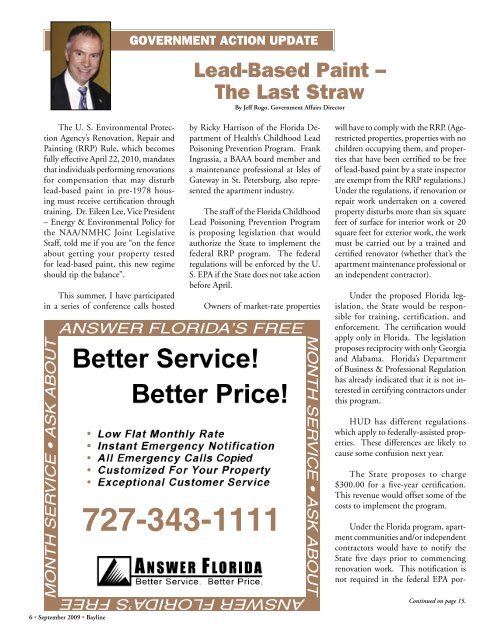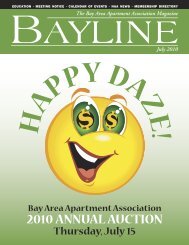Bayline September 09.indd - Bay Area Apartment Association
Bayline September 09.indd - Bay Area Apartment Association
Bayline September 09.indd - Bay Area Apartment Association
You also want an ePaper? Increase the reach of your titles
YUMPU automatically turns print PDFs into web optimized ePapers that Google loves.
The U. S. Environmental Protection<br />
Agency’s Renovation, Repair and<br />
Painting (RRP) Rule, which becomes<br />
fully effective April 22, 2010, mandates<br />
that individuals performing renovations<br />
for compensation that may disturb<br />
lead-based paint in pre-1978 housing<br />
must receive certifi cation through<br />
training. Dr. Eileen Lee, Vice President<br />
– Energy & Environmental Policy for<br />
the NAA/NMHC Joint Legislative<br />
Staff, told me if you are “on the fence<br />
about getting your property tested<br />
for lead-based paint, this new regime<br />
should tip the balance”.<br />
This summer, I have participated<br />
in a series of conference calls hosted<br />
•<br />
•<br />
•<br />
•<br />
•<br />
6 • <strong>September</strong> 2009 • <strong><strong>Bay</strong>line</strong><br />
GOVERNMENT ACTION UPDATE<br />
727-343-1111<br />
Lead-Based Paint –<br />
The Last Straw<br />
By Jeff Rogo, Government Affairs Director<br />
by Ricky Harrison of the Florida Department<br />
of Health’s Childhood Lead<br />
Poisoning Prevention Program. Frank<br />
Ingrassia, a BAAA board member and<br />
a maintenance professional at Isles of<br />
Gateway in St. Petersburg, also represented<br />
the apartment industry.<br />
The staff of the Florida Childhood<br />
Lead Poisoning Prevention Program<br />
is proposing legislation that would<br />
authorize the State to implement the<br />
federal RRP program. The federal<br />
regulations will be enforced by the U.<br />
S. EPA if the State does not take action<br />
before April.<br />
Owners of market-rate properties<br />
will have to comply with the RRP. (Agerestricted<br />
properties, properties with no<br />
children occupying them, and properties<br />
that have been certifi ed to be free<br />
of lead-based paint by a state inspector<br />
are exempt from the RRP regulations.)<br />
Under the regulations, if renovation or<br />
repair work undertaken on a covered<br />
property disturbs more than six square<br />
feet of surface for interior work or 20<br />
square feet for exterior work, the work<br />
must be carried out by a trained and<br />
certifi ed renovator (whether that’s the<br />
apartment maintenance professional or<br />
an independent contractor).<br />
Under the proposed Florida legislation,<br />
the State would be responsible<br />
for training, certification, and<br />
enforcement. The certifi cation would<br />
apply only in Florida. The legislation<br />
proposes reciprocity with only Georgia<br />
and Alabama. Florida’s Department<br />
of Business & Professional Regulation<br />
has already indicated that it is not interested<br />
in certifying contractors under<br />
this program.<br />
HUD has different regulations<br />
which apply to federally-assisted properties.<br />
These differences are likely to<br />
cause some confusion next year.<br />
The State proposes to charge<br />
$300.00 for a fi ve-year certifi cation.<br />
This revenue would offset some of the<br />
costs to implement the program.<br />
Under the Florida program, apartment<br />
communities and/or independent<br />
contractors would have to notify the<br />
State fi ve days prior to commencing<br />
renovation work. This notifi cation is<br />
not required in the federal EPA por-<br />
Continued on page 15.





